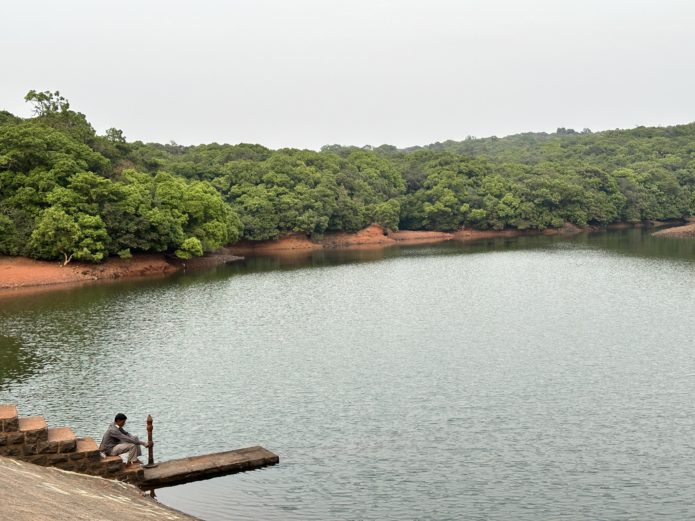Three or four Fridays ago, I was taking a stroll. It had been a tough day, and the retreating monsoon had left its mark in the morning. As usual, I was out unwinding, trying to move on from the dreadful day’s leftover froth. That’s when a styrofoam cup, freshly emptied of its coffee, but not fully of its froth, landed an inch from my feet. I looked up, but amidst the maze of dull and dead windows in the apartment building, it seemed ghosts had just had their strong coffee. There wasn’t a soul in sight. The only thing moving was up in the sky: a big plane, its underside letting go of a bold golden scream: ‘Emirates’.
For a moment, I wondered—could the cup have come from the plane? My mind quickly jumped to The Gods Must Be Crazy, a film I watched as a kid. A film that left its mark. In the film, a simple Coca-Cola bottle thrown from a plane brings chaos to a peaceful tribe. It was funny, absurd, and deeply thought-provoking.
But as I stared at that cup and thought about the plane above, another question popped into my head—the kind of question that drags me down a rabbit hole, as though my brain were a carrot offered to a waiting rabbit.
What if the cup didn’t come from the plane? What if it came from space?
Falling Debris—Not Just a Styrofoam Cup
Once home, I found myself reading about Alejandro Otero in Florida. Something had crashed into his home—not a styrofoam cup, but a chunk of metal alloy weighing 1.6 pounds, falling from space. No, it wasn’t an alien invasion—it was space debris. Till recently, it was part of the International Space Station.
NASA’s response? “The hardware was expected to fully burn up during entry through Earth’s atmosphere on March 8, 2024. However, a piece of hardware survived and impacted a home in Naples, Florida.” Roughly translated: Oops.
In the next hour of scrolling, I found that NASA isn’t the only space cowboy littering stuff up there. SpaceX debris once flattened an animal enclosure in Indonesia. Fortunately, no animals were present. Or take the case of the 20-tonne Chinese Long March 5B rocket, which hurtled from Los Angeles to New York in under nine minutes. Eventually, it broke apart, and pieces fell into a village in the Ivory Coast. Well, God is kind.
The Sky Is (Literally) Falling
As I jumped from one URL to another, it became clear that these incidents aren’t isolated. Space debris is piling up. The European Space Agency estimates there are 36,500 pieces of debris larger than 10 cm orbiting Earth, with a total mass exceeding 11,500 metric tons. We’re talking about everything from paint flecks to dead satellites. The more we launch, the more junk we leave behind.
Then I read something that made me pause. Moriba Jah, an aerospace engineer, warned that falling debris will eventually kill someone. A 2022 study predicts a 10% chance of casualties by 2032. Jah might not be Nostradamus, but the data suggests that his concern isn’t far-fetched.
What If It Hits an Aircraft?
And just when I thought it couldn’t get worse, another thought struck me: What if this random debris hit an aircraft? As is the way with the internet, it didn’t take long to find new material in that direction.
In 1996, a Boeing 757’s windscreen was cracked by an unidentified object at 31,500 feet. In 2013, another Boeing 757 had its nose-cone punctured by something unknown at 26,000 feet. Bird strikes were ruled out. Between voodoo and space debris, what do you think is the likelier cause?
As both air traffic and space junk increase, so do the risks. In November 2022, Spain and France even closed parts of their airspace because of a Chinese rocket body re-entering the atmosphere. Over 300 flights were disrupted.
What’s the Solution?
By now, I’d brewed some extra-strong espresso as there seemed to be no light at the end of this rabbit hole. What could be done?
One suggestion was to stop treating satellites as single-use. There’s precedent for this thinking. In the 1970s, the risk of oil spills led to calls for double hulls on tankers. The shipping industry resisted, but after the Exxon Valdez disaster in 1989, the US mandated double hulls. The world followed.
Today, space launches could be similarly regulated, with mandated disposal plans for satellites and rocket bodies. Hopefully, we won’t have to wait for an airplane full of passengers to be struck by a rogue satellite’s unhinged door before these regulations take effect.
The European Space Agency has announced a Zero Debris Charter aimed at tackling the problem at its root. I read about it, yawning without realising.
Meanwhile, I’ve made a few decisions of my own.
Take my strolls with care—the folks in my apartment building haven’t signed any charters! If I’m the unlucky one on any given day, it’s my problem.
And live with gratitude. When I deal with dreary email and deadly calls, I’ve resolved to remind myself that at least it’s not as bad as a debilitating piece of alloy from outer space.













